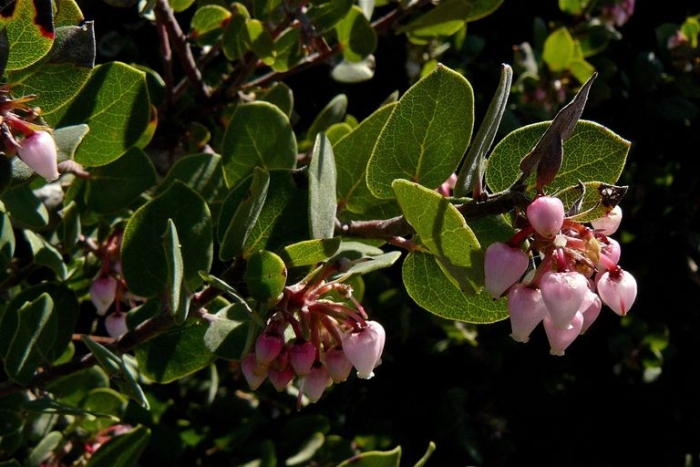Morro Manzanita
(Arctostaphylos morroensis)
Morro Manzanita (Arctostaphylos morroensis)
/
/

Jean Pawek
CC BY 3.0
Image By:
Jean Pawek
Recorded By:
Copyright:
CC BY 3.0
Copyright Notice:
Photo by: Jean Pawek | License Type: CC BY 3.0 | License URL: http://creativecommons.org/licenses/by/3.0/ | Attribution: 2012 Jean Pawek | Publisher: Calphotos |

































































Estimated Native Range
Summary
Arctostaphylos morroensis, commonly known as Morro Manzanita, is an evergreen shrub native to the coastal dunes and maritime chaparral of San Luis Obispo County in Central California. This species is adapted to sandy soils and is often found in the unique ecological zone where coastal sage scrub and chaparral intermingle. Morro Manzanita typically reaches up to 4 meters in height and tends to be wider than tall, with a spreading habit that can provide substantial ground cover. It features shreddy red-gray bark that peels in thin strips, adding textural interest, and the smaller branches and twigs are adorned with whiskery bristles.
The plant is known for its oval-shaped, slightly convex leaves that are dark green on the upper surface and a duller gray-green beneath, which contrast nicely with the bark. During the winter months, it produces plentiful flowers that hang in dense clusters on short pedicels. The flowers are usually very light pink, urn-shaped, and hairy inside, adding a subtle charm to the winter landscape. Following the flowering season, the plant bears fuzzy red drupes, each about a centimeter wide, which can attract birds and other wildlife. Morro Manzanita is cultivated for its ornamental value in California native plant gardens, drought-tolerant landscapes, and natural habitat gardens. It is particularly valued for its low water requirements, making it suitable for xeriscaping. In cultivation, it thrives in full sun or part shade and prefers soils with fast drainage. While generally low-maintenance, it can be susceptible to fungal diseases such as root rot if overwatered or planted in poorly draining soils.CC BY-SA 4.0
The plant is known for its oval-shaped, slightly convex leaves that are dark green on the upper surface and a duller gray-green beneath, which contrast nicely with the bark. During the winter months, it produces plentiful flowers that hang in dense clusters on short pedicels. The flowers are usually very light pink, urn-shaped, and hairy inside, adding a subtle charm to the winter landscape. Following the flowering season, the plant bears fuzzy red drupes, each about a centimeter wide, which can attract birds and other wildlife. Morro Manzanita is cultivated for its ornamental value in California native plant gardens, drought-tolerant landscapes, and natural habitat gardens. It is particularly valued for its low water requirements, making it suitable for xeriscaping. In cultivation, it thrives in full sun or part shade and prefers soils with fast drainage. While generally low-maintenance, it can be susceptible to fungal diseases such as root rot if overwatered or planted in poorly draining soils.CC BY-SA 4.0
Plant Description
- Plant Type: Shrub
- Height: 4-6.5 feet
- Width: 4-7 feet
- Growth Rate: Moderate
- Flower Color: Pink, White
- Flowering Season: Spring, Winter
- Leaf Retention: Evergreen
Growth Requirements
- Sun: Full Sun, Part Shade
- Water: Very Low, Low
- Drainage: Fast
Common Uses
Bee Garden, Bird Garden, Butterfly Garden, Deer Resistant, Drought Tolerant, Hummingbird Garden, Low Maintenance, Salt Tolerant, Showy Flowers
Natural Habitat
Coastal dunes and maritime chaparral
Other Names
Common Names:
Scientific Names: , Arctostaphylos morroensis,
GBIF Accepted Name: Arctostaphylos morroensis Wiesl. & Schreib.